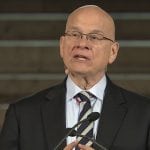Earlier this month I had the great privilege of attending a gathering of church and movement leaders hosted by Terry Virgo, founder of Newfrontiers. This is the fourth year I have attended, and we met for 24 hours to share and pray. It has been a blessing to get to know the leaders of many of the major Restorationist and new church movements, and I have appreciated their warm welcome. I have learned much, and it is always encouraging to hear how God is at work in the UK and around the world.
There were a number of common themes that stood out to me as the 20 leaders present shared how the Lord was at work in their different constituencies, which together provide a snapshot of the challenges and opportunities facing the evangelical church today.
1. Growing Christmas Carol Services
Virtually everyone spoke of the surprisingly large numbers of people attending Christmas carol services, often hundreds more than were expected, and they are seeing year-over-year growth. For all the talk of secularism there seems to be no barrier to non-Christians coming to church at Christmas. Carol services remain a key evangelistic opportunity and chance to showcase the life of the church to visitors.
2. Effective Evangelistic Outreach through CAP and Foodbanks
A number of church leaders reported that the majority of their contacts and conversions had come through their CAP (Christians Against Poverty) initiatives and the foodbanks they had established. CAP seems to create especially fruitful opportunities for evangelism because of the relationship formed with those who seek help. One church had seen more than 10,000 people use their foodbank over the year, and this provided them with important links with the community and the local authority. It was clear that foodbanks were not primarily a result of poverty as such, but because of problems with people not able to access the benefits to which they were entitled quickly enough. Only those referred by social services can use foodbanks, and help is always on a limited and short-term basis.
3. Proliferation of Multi-Site Churches
Many larger churches are adopting a multi-site model of ministry to facilitate growth. Traditional church plants are felt to be riskier and less effective. A primary driver is also the fact that it is prohibitively expensive and impractical to expand church buildings to accommodate growing congregations. The multi-site model developing here in the UK seems to be different to that in the United States. Few are establishing multi-sites with a video-linked preachers. In some cases a main preacher will speak at five or six venues per Sunday, and will be driven between sites. In other cases there are local site pastors/preachers, and the senior pastor will preach from time to time. Many of the leaders present saw multi-site as a medium-term means of church planting, with the expectation that the sites will eventually become autonomous churches. Some multi-site churches are operating in a specific geographical area (a borough or a city) whereas others are operating across sites in several cities. Multiple congregations meeting in the same building is a form of multi-site in a single venue. As one church leader commented, the fastest way to grow a church in the UK is to establish a second morning congregation. The leaders I met were not adopting multi-site unthinkingly, and as a mere pragmatic fad, but were acting from gospel motives to expand the mission of the church.
4. Remember the Needs of the Global Church
Many of the leaders in our meeting have international ministries that serve churches around the world. I was struck by how easily we forget the needs of brothers and sisters around the world because we allow the urgency of the immediate, which drives the news coverage, to crowd out the important. How easily we neglect the needs of the church in Ukraine, West Africa, and Zimbabwe because these stories have faded from the headlines. It was moving to hear of the struggles that churches are facing in some of these countries, and how the Western media has not told the true or full story. It was also encouraging to hear how the church is growing in France, and to be challenged by the massive gospel need in Belgium. We need to maintain an international gospel vision for the church, and not simply be led by the latest news headlines. We need to pray for the church around the world with specific kingdom priorities, not just to pray for “peace” generically for the latest trouble spot that happens to be in the news.
5. The Christian Situation in the United States Is Not the Same as in the UK
It is all too easy to assume that the church in the United States and the UK are facing identical challenges, and that the problems prevalent in the United States are also prevalent in the UK. For example, I think that some of the alleged problems of “New Calvinism” in the United States are emerging because leaders from an Arminian revivalist background have discovered Reformed soteriology. That is not the case in the UK to the same degree. I was reminded of this difference when a couple of leaders contrasted the ministry focus in the United States and the UK. In the United States they were asked to minister to Reformed church leaders who wanted to know more about the gifts of the Spirit because cessationism is not taught in the New Testament. In the UK the same leaders were urging some charismatics to abandon unbiblical excesses in their practice. We need to understand the needs and challenges of the church in its specific context and culture. Not every sneeze in the United States church means we need to look for the resulting cold in the UK. Nor should we assume that U.S. leaders and models have the answer to the challenges we face in the UK.
6. The Importance of Planning for Leadership Transition
One key issue that emerged several times was the importance, and difficulty, of transitions in leadership, both at the level of the local church and also within movements. This is especially problematic in the case of new churches and movements where there has never been the need for a leader to retire and be replaced. Every church and movement needs to plan carefully and strategically for transition. This is an area where many long established churches are also weak. Transition is especially difficult where a church or ministry has been built around a particularly gifted individual—a problem that can occur in both conservative and charismatic churches.
7. Responding to Changes in Attitude Towards Homosexuality in Society
A major issue facing the church is the challenge from changing attitudes in wider society towards homosexuality and same-sex marriage, especially as more “evangelicals” are abandoning orthodox biblical teaching. Sam Allberry gave a brilliant summary of how the church should minister the gospel to gay people, stressing that those who struggle with same-sex orientation are not being asked to make an entirely different order of sacrifice to follow Christ and live by his Word than others. Everyone who follows Christ is called to repent and give up their lives for Jesus, yet the church has failed to stress the radical demands of discipleship for everyone. Following Christ will inevitably involve sacrificial costs but also bring blessings, both in this life and also in eternity. I was especially struck by the need for the church to provide an environment in which celibate believers struggling with same-sex attraction can flourish, which will require the church to become a true family for all its members. Sadly the church has too often idolized the heterosexual nuclear family, and not been a family for singles, widows, divorcees, and those with same-sex orientation. This is a massive challenge for all our churches. Allbery has written an excellent short book, Is God Anti-Gay?, that ought to be required reading for all pastors, leaders, and church members.
8. Relatively Small Number of Conversions
No one was really seeing large scale numbers of conversions, although there were many glorious accounts of individuals who had been saved. Evangelism seems to be slow and steady with more and more effort required to reach people. I did notice that the churches that reported most conversions—some even had conversions every week—were those that intentionally preached the gospel every week and had some kind of “altar call.” I have lots of caveats, but it did leave me wondering whether we have lost something of the need to press people to respond to Christ and of helping them to do so. I remember when I was first converted it was quite common in conservative churches and at evangelistic events and missions to invite people to “pray a prayer” or indicate a response. No doubt this appeal can be abused and emotionally manipulated, but if we simply set out to “explain the Bible” rather than to “preach the gospel” is it surprising we see few conversions? Is that what we are “preaching for”? Jesus called people to repent and follow him, and to take action on the spot to respond, as did the apostles in Acts. They exhorted and commanded a response. Surely a good Calvinist can do that, trusting that the Lord will call his people, without assuming that it is all stage-managed. When was the last time we actually called people to repent and believe “as one who speaks the very words of God” (1 Pet. 4:11) or urged our hearers to “be reconciled to God” because we are his ambassadors (2 Cor. 5:20-21)? Jesus has entrusted us with the gospel message and the authority to call people to follow him.
9. Still Longing for Revival
The moment seems to be slow steady gospel growth against a background of general church decline. But the leaders in this meeting longed for more from God and did not want to settle. We were reminded not to lose sight of the fact that God can work in revival, and has done so wonderfully in our nation in the past. This was not a desire for the manufactured revivalism of Charles Finney (most of the leaders present would have considered themselves Reformed) but for God to work in power and mercy as he did at the time of George Whitefield, Jonathan Edwards, and John Wesley, and subsequently D. L. Moody and C. H. Spurgeon. One of the challenges we face is to minister faithfully day-to-day accepting that the Lord is not currently working in these remarkable and unusual ways, and yet longing that he might do a greater work for the sake of his glory. I am reading Michael Horton’s great book Ordinary, which emphasizes the need for us to trust to the use of God’s “ordinary” means for the work of the gospel. However we shouldn’t forget that God can, in his sovereignty, choose to bless the use of such “ordinary” means with “extraordinary” results. Danger comes when we begin to using manufactured or unbiblical means to try to achieve the “extraordinary” results. But there is also a danger when we stop longing and praying for God to do more through the “ordinary” means or prayer and preaching the gospel—something that Paul does again and again in his letters.
I was grateful for the time with these gospel partners, the encouragement I received, and the insights I gleaned from them and their experiences. I hope they are helpful as you seek to understand the current spiritual climate in the UK, and as you pray and plan to minister the gospel as effectively as possible.
Is there enough evidence for us to believe the Gospels?
 In an age of faith deconstruction and skepticism about the Bible’s authority, it’s common to hear claims that the Gospels are unreliable propaganda. And if the Gospels are shown to be historically unreliable, the whole foundation of Christianity begins to crumble.
In an age of faith deconstruction and skepticism about the Bible’s authority, it’s common to hear claims that the Gospels are unreliable propaganda. And if the Gospels are shown to be historically unreliable, the whole foundation of Christianity begins to crumble.


































